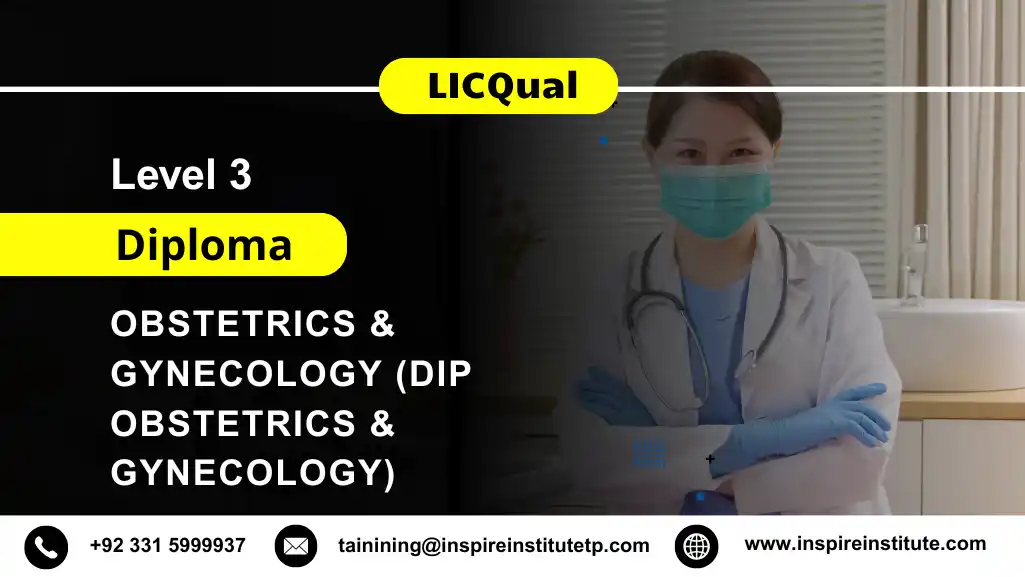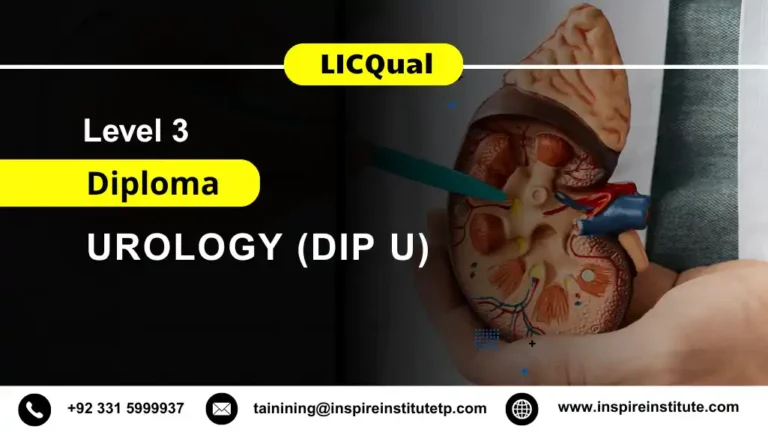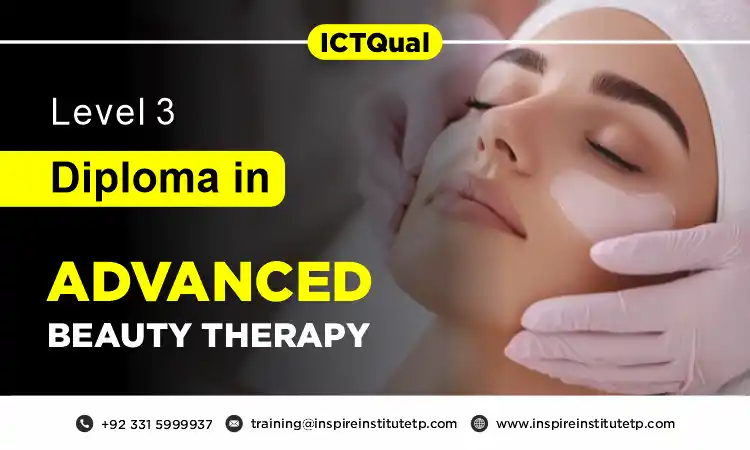LICQual Level 3 Diploma in Obstetrics and Gynecology (Dip Obstetrics and Gynecology)
The LICQual Level 3 Diploma in Obstetrics and Gynecology (Dip Obstetrics and Gynecology) is a UK-accredited qualification designed to meet the growing demand for skilled professionals in women’s health and reproductive care. Obstetrics and gynecology play a vital role in healthcare, focusing on maternal health, pregnancy management, childbirth, and the diagnosis and treatment of female reproductive system disorders. This course provides learners with a strong academic foundation and practical competence to address the challenges of modern women’s healthcare.
This obstetrics and gynecology course offers comprehensive knowledge of pregnancy care, gynecological conditions, fertility issues, and preventive health measures. Learners will gain insights into reproductive anatomy, maternal health protocols, prenatal and postnatal care, and gynecological procedures. The programme emphasizes both theoretical learning and practical application, ensuring graduates are fully prepared to deliver safe, evidence-based, and patient-centered healthcare services.
The LICQual Level 3 Diploma in Obstetrics and Gynecology is designed as an assignment-based qualification, making it a flexible pathway for busy healthcare professionals. Whether learners are nurses, midwives, general practitioners, or allied health staff, this course enables them to balance clinical responsibilities with academic progression. The flexible format ensures accessibility while maintaining high standards of training in women’s health and reproductive medicine.
By enrolling in this UK-accredited diploma in obstetrics and gynecology, learners will develop essential clinical skills, including obstetric examination, gynecological assessment, patient counseling, and management of maternal health risks. They will also gain expertise in ethical practice, patient engagement, and evidence-based treatment strategies, which are essential in modern healthcare environments. This combination of knowledge and practice makes the qualification valuable worldwide.
The scope of this women’s health training programme extends to preparing learners for careers in hospitals, maternity units, clinics, fertility centers, and community healthcare. Graduates can pursue professional roles in obstetrics, gynecology, maternal health services, or healthcare education. This diploma strengthens career opportunities while improving the quality of care delivered to women across different stages of life.
The LICQual Level 3 Diploma in Obstetrics and Gynecology (Dip Obstetrics and Gynecology) empowers healthcare professionals to advance their careers while making a meaningful contribution to maternal and reproductive health. By completing this gynecology skills diploma, learners gain the academic recognition, clinical expertise, and practical training needed to excel in obstetrics and gynecology. It is an essential qualification for professionals who aspire to deliver safe, effective, and compassionate care in women’s healthcare.
Why Choose this Qualification
The LICQual Level 3 Diploma in Obstetrics and Gynecology (Dip Obstetrics and Gynecology) is a UK-accredited qualification designed for healthcare professionals seeking to advance their knowledge and practical skills in maternal health, reproductive care, and gynecological practice. This course combines advanced theoretical learning with practical applications, enabling learners to understand obstetric procedures, gynecological assessments, treatment strategies, and patient-centered care approaches essential in modern women’s healthcare. Designed as an assignment-based programme, it provides flexibility for professionals balancing clinical responsibilities with continuing education.
Key Reasons to Choose this Qualification:
Specialist Knowledge: Gain a comprehensive understanding of obstetrics and gynecology, including reproductive health, pregnancy management, childbirth procedures, and common gynecological conditions. Learn evidence-based approaches to maternal health assessment, prenatal and postnatal care, fertility management, and patient counseling. This knowledge equips professionals to deliver safe, effective, and informed women’s healthcare services.
Practical Application: Develop competence in conducting obstetric and gynecological examinations, supporting patients during pregnancy and childbirth, creating care plans, and managing reproductive health concerns. Learners also gain skills in monitoring maternal and fetal progress, implementing safe delivery practices, and collaborating with multidisciplinary teams to ensure holistic and patient-focused care.
UK-Accredited Diploma: Earn a UK-recognised qualification that validates expertise in obstetrics and gynecology and enhances professional credibility. Accreditation ensures alignment with international healthcare standards, making this diploma valuable for nurses, midwives, general practitioners, healthcare assistants, and allied health professionals seeking specialisation in maternal and reproductive healthcare.
Flexible Learning Pathway: Benefit from an assignment-based structure that allows learners to progress at their own pace while continuing to work in hospitals, clinics, or community healthcare settings. This flexible format supports busy healthcare professionals who wish to advance academically without interrupting patient care responsibilities.
Evidence-Based Training: Explore current research, clinical protocols, and best practices in obstetric and gynecological care. The programme emphasises safe practices, ethical care, patient engagement, and evidence-based medical approaches to improve outcomes for women across all stages of reproductive health.
Career Development: Expand career opportunities in hospitals, maternity units, gynecology clinics, fertility centers, and healthcare education. The LICQual Level 3 Diploma in Obstetrics and Gynecology equips learners with the expertise to contribute to improved women’s healthcare outcomes and advance professionally within the medical and healthcare sector.
The LICQual Level 3 Diploma in Obstetrics and Gynecology (Dip Obstetrics and Gynecology) empowers healthcare professionals with the knowledge, clinical skills, and UK-accredited recognition necessary to deliver high-quality, evidence-based maternal and gynecological care. It is an essential qualification for those looking to advance their careers while improving patient outcomes in the growing field of women’s health and reproductive medicine.
Course Overview
LICQual UK Awarding Body
Average Completion Time:
4-12 Months
Study Units: 6 Units
Evidence & Assignment Based
Mandatory Units
Who Should Take This Course
The LICQual Level 3 Diploma in Obstetrics and Gynecology (Dip Obstetrics and Gynecology) is a UK-accredited qualification designed for healthcare professionals who wish to develop advanced knowledge and practical skills in maternal health, reproductive medicine, and women’s healthcare management. This course is ideal for practitioners aiming to improve patient outcomes, implement evidence-based interventions, and progress within the specialised field of obstetrics and gynecology. It equips learners with in-depth theoretical insights and practical approaches to pregnancy care, gynecological assessment, treatment planning, and patient-centered care, supporting both professional growth and improved quality of women’s healthcare services in clinical and community settings.
This course is suitable for:
Nurses and Midwives: Professionals seeking to enhance their expertise in pregnancy management, maternal care, childbirth procedures, and women’s reproductive health, enabling them to deliver safe, effective, and compassionate care.
General Practitioners and Physicians: Clinicians wishing to strengthen their skills in obstetric and gynecological diagnosis, prenatal and postnatal management, and multidisciplinary care planning to optimise patient health outcomes.
Aspiring Specialists: Healthcare professionals preparing for higher-level qualifications or specialist pathways in obstetrics, gynecology, or reproductive medicine who want to establish a strong academic and clinical foundation.
Healthcare Assistants and Allied Professionals: Practitioners aiming to develop competencies in supporting maternal health, patient monitoring, gynecological procedures, and family planning services within hospital or community settings.
Healthcare Educators and Trainers: Professionals interested in advancing their knowledge of women’s health and reproductive care to support teaching, research, or evidence-based training within the field of obstetrics and gynecology.
Healthcare-Oriented Learners: Individuals with a professional interest in maternal and reproductive health who wish to understand the principles, treatment strategies, and impact of obstetric and gynecological care on women’s well-being.
The LICQual Level 3 Diploma in Obstetrics and Gynecology (Dip Obstetrics and Gynecology) is particularly valuable for healthcare professionals seeking to specialise in women’s health, strengthen their clinical expertise, and achieve a UK-accredited qualification. By combining evidence-based learning with practical application, this diploma supports career progression, professional recognition, and the ability to meet the growing demand for skilled obstetric and gynecological practitioners in modern healthcare.
Course Benefits
The LICQual Level 3 Diploma in Obstetrics and Gynecology (Dip Obstetrics and Gynecology) provides significant benefits for healthcare professionals seeking to enhance their expertise in maternal health, reproductive care, and women’s well-being. By combining advanced theoretical knowledge with practical application, this diploma equips learners to deliver personalised obstetric and gynecological care, implement effective treatment strategies, and improve overall patient outcomes. Designed as a flexible, assignment-based programme, it fosters professional development while maintaining clinical and academic excellence in modern women’s healthcare practice.
Key Benefits of the Course:
- Specialist Knowledge: Gain a comprehensive understanding of obstetrics and gynecology, including antenatal and postnatal care, maternal health assessments, reproductive health management, and gynecological conditions. Learners explore pregnancy complications, fertility issues, and women’s health challenges, enabling evidence-based decision-making and improved patient care.
- Practical Application: Develop competence in conducting maternal assessments, supporting safe childbirth, managing gynecological cases, and delivering patient-focused care throughout pregnancy and reproductive health journeys. Learners also acquire skills in patient counselling, emergency response during maternal complications, and promoting women’s health in community and clinical settings.
- Recognised Qualification: Earn a UK-accredited diploma that validates advanced expertise in obstetrics and gynecology and opens professional opportunities in hospitals, maternity wards, women’s health clinics, and educational institutions. Accreditation ensures alignment with global healthcare standards and best practices.
- Flexible Learning Pathway: Benefit from an assignment-based study structure that allows learners to advance academically while managing professional responsibilities. This flexible format is ideal for busy healthcare practitioners balancing patient care with further education.
- Evidence-Based Training: Explore the latest research, clinical protocols, and guidelines in obstetric and gynecological practice, ensuring safe, effective, and evidence-driven healthcare. Learners are trained to adopt modern treatment approaches while prioritising patient safety and well-being.
- Career Development: Expand career pathways as an obstetric or gynecology practitioner, progress towards specialist training, or take leadership roles in clinical care and education. This qualification strengthens employability in both clinical and academic environments.
- Enhanced Patient Care: Contribute to improved patient outcomes through accurate maternal assessments, evidence-based interventions, and patient-focused care. The ability to manage complex pregnancy and reproductive cases enhances long-term health and quality of life for women.
- Professional Growth: Strengthen clinical skills, patient communication, and interdisciplinary collaboration. This diploma prepares healthcare professionals to play a key role in women’s health, improving care quality and patient safety.
The LICQual Level 3 Diploma in Obstetrics and Gynecology (Dip Obstetrics and Gynecology) equips learners with advanced knowledge, practical skills, and a UK-recognised qualification. It empowers healthcare professionals to expand their expertise, deliver better outcomes in maternal and reproductive health, and pursue career progression while meeting the growing demand for skilled obstetrics and gynecology specialists.
Eligibility Criteria
The LICQual Level 3 Diploma in Obstetrics and Gynecology (Dip Obstetrics and Gynecology) is a UK-accredited programme designed for healthcare professionals who wish to enhance their expertise in maternal health, reproductive care, and gynecological practice. This assignment-based qualification combines advanced theoretical knowledge with practical application, making it ideal for nurses, general practitioners, midwives, and healthcare educators aiming to develop specialist skills in obstetrics and gynecology. By meeting the entry requirements, learners ensure they are fully prepared to succeed in the programme and apply their knowledge confidently in clinical and community women’s healthcare settings.
Educational Background:
Applicants must hold a recognised healthcare qualification such as a nursing degree, diploma in healthcare practice, midwifery degree, medical degree, or an equivalent qualification. Those with Level 2 or Level 3 qualifications in healthcare, maternal health, or related fields may also be considered. Equivalent international qualifications will be reviewed on a case-by-case basis to ensure suitability for the programme.
Professional Experience:
A minimum of one year of clinical, maternal health, or community healthcare experience is recommended. Prior exposure to obstetric or gynecological care, reproductive health services, or patient support is advantageous, though motivated healthcare professionals without direct women’s health experience may also apply.
Age Requirement:
Learners must be at least 18 years of age at the time of enrolment, ensuring they possess the professional maturity, responsibility, and clinical judgment required for advanced training.
Language Proficiency:
Since the programme is delivered in English, learners should demonstrate proficiency in reading, writing, and communication. A minimum IELTS score of 6.0 or an equivalent qualification is recommended for non-native English speakers to ensure they can complete assignments and fully engage with course materials.
Technical Requirements:
Applicants should have access to a computer or laptop with a stable internet connection, as well as basic IT skills to manage digital resources, research, and assignment submission through online platforms.
Required Documents:
Submission of a valid ID or passport, proof of educational qualifications, and evidence of professional experience (if applicable) is necessary for registration. Additional documentation may be required for applicants presenting international qualifications.
The Qualification Process
LICQual Level 3 Diploma in Obstetrics and Gynecology (Dip Obstetrics and Gynecology)
follows a structured pathway to ensure learners gain comprehensive knowledge, practical skills, and professional competence in community oral healthcare.
Step 1: Self-Assessment
Learners review the entry requirements to confirm eligibility. Candidates with a background in dentistry, oral health, or public health are encouraged to apply.
Step 2: Registration
Complete the registration process by submitting required documents such as proof of qualifications, a valid ID, and payment of enrollment fees.
Step 3: Induction
An induction session is conducted to:
- Verify learner eligibility and documentation.
- Introduce study materials, learning outcomes, and assessment procedures.
Step 4: Learning and Evidence Submission
Learners complete assignments, case studies, and practical exercises demonstrating competence in public health dentistry, community oral health assessment, preventive strategies, and program planning.
Step 5: Feedback and Revision
Assessors review submitted evidence and provide constructive feedback. Learners can revise and resubmit work to meet all required standards.
Step 6: Competence Validation
Final submissions are evaluated to confirm that learners have met all theoretical and practical learning outcomes.
Step 7: Internal Quality Assurance (IQA)
The IQA team reviews the assessment process to ensure accuracy, fairness, and compliance with international standards.
Step 8: External Verification (EQA)
External verifiers validate the authenticity and quality of learner achievements.
Step 9: Certification
Upon successful verification, learners are awarded LICQual Level 3 Diploma in Obstetrics and Gynecology (Dip Obstetrics and Gynecology) , demonstrating advanced proficiency in community oral healthcare and preparing them for professional growth in dental public health, preventive dentistry, and healthcare policy.







